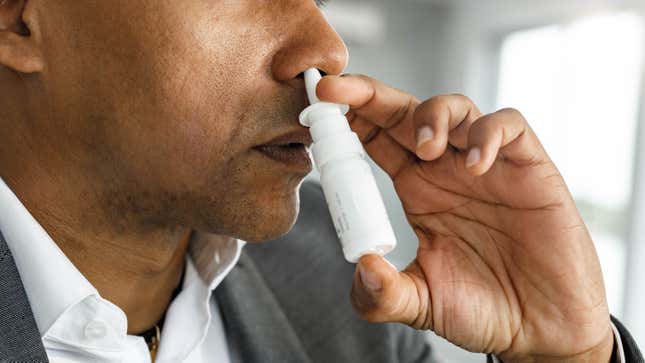
A bonafide treatment for the common cold has eluded scientists for decades. But recent animal research from a team in Australia suggests that their experimental drug—delivered via nasal spray—could help the immune system fend off all sorts of respiratory infections. The treatment is now set to be tested out in a clinical trial of people in a matter of weeks.
The treatment is called INNA-X and is being developed by Ena Respiratory, a biotech company in Australia. The therapy is intended to buff up the immune system through activating a class of proteins called Toll-like receptors (TLRs). TLRs play a key role in the innate immune system, which is the first line of defense against foreign pathogens. This innate immune response not only attacks germs but also rallies the rest of the immune system into action.
“We have discovered that INNA-X primes the innate immune system in the airways so that when a virus enters your body (nose or throat) and initiates infection, your immune system is able to respond much more quickly and control the virus in the crucial first days after exposure to the virus,” Nathan Bartlett, a virologist at the University of Newcastle and Hunter Medical Research Institute who is working with Ena to study the drug, told Gizmodo in an email.
Though the development of INNA-X began before the pandemic, the treatment should ideally offer broad protection against SARS-CoV-2, the coronavirus that causes covid-19, as well as the many viruses that cause the common cold, such as rhinoviruses. In two recent animal studies published last month, that seems to be the case.
One study conducted in ferrets—animals that are very vulnerable to SARS-CoV-2—found the drug could reduce replication of the coronavirus by up to 96% when compared to natural infection. Another study in mice found that INNA-X could boost the innate immune response against rhinovirus, leading to lower viral loads and lessened inflammation caused by viral infection. That study found that the drug could still affect airway cells taken from people with asthma, a condition known to dampen people’s natural immune response to respiratory viruses.
Successful studies in animals or human cells don’t always translate to a successful drug in people, of course. And even if INNA-X is successful, it wont be the perfect common cold cure we’re all hoping for. The immune-boosting effect of the drug is thought to last for about a week, so one dose wouldn’t protect people through the full cold and flu season (that said, other preclinical research has suggested it can be safely taken repeatedly). But it might still be a useful treatment for people at high risk of exposure or if taken soon after a confirmed exposure. In the context of covid-19 or future pandemics caused by similar viruses, the company hopes it could be used as a prophylactic to bridge the gap before an effective vaccine is available.
The next step of Ena’s research will test out a candidate for human use called INNA-05. This small Phase I clinical trial will only examine the safety of the treatment in healthy volunteers recruited in Australia, not its effectiveness. But the company has said that the drug could be available for use in as soon as 18 months if it continues to show promise in human trials.